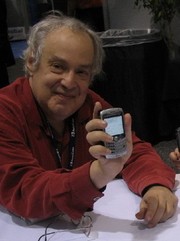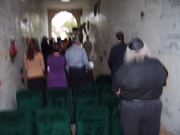A New York Times article involving my friend Russell Shaw came out today, and it was just about as bad as expected.
I don’t blame the writer, Matt Richtel, with whom I shared a very pleasant conversation. Neither does my editor, Larry Dignan. We both understand that editors tend to cut away anything which doesn’t flow directly from a story’s main point.
The story, as written, is designed as an indictment against web reporting and blogging, but ironically it stands as its opposite. By ignoring the other side in the interests of space, the Times’ editors demonstrated precisely what’s wrong with the paper medium, and the broadcast medium. A lack of space.
The fact is, as I told Matt, Russell Shaw did not die in vain. He did not die from overwork. He died in love. Ellen Green was his fiance, but in many ways she was his mistress. Journalism was his wife, and he was always true to journalism. He died in journalism’s arms, like a soldier falling in battle or a politician in his mistress’ bed. He died much as David Halberstam did. To a journalist, the difference between a car wreck on the way to an interview and a heart attack while waiting for one is the same tragedy — you missed the interview.
The point is not that Russell overworked himself blogging. He overworked himself doing what he loved to do. He was a freelance, like me. He best moments were, as Rabbi Stone noted in his eulogy, when he could put a -30- on the end of a story. That feeling of accomplishment, the knowledge you’ve done your best and sent something worthwhile to readers is like a hit of cocaine to a journalist. It’s what we live for. It’s why we usually don’t write novels until we retire.
Of course journalism is a young man’s game. The adrenaline rush from
following a really big story can be overpowering.
When I covered my
first Fall Comdex, back in the mid-1980s, I was so excited to finally
be in Las Vegas that I walked out of my hotel room at the Tropicana the
Sunday before the opening, walked all the way downtown, then walked to
the Convention Center to pick up my credentials. This was 15 miles of
walking before a trade show which then featured miles of aisles. It
hurt, and I switched to sneakers on my second day of coverage, but it
was a good hurt, even a glorious one.
The point is that journalism isn’t just a job. It’s a compulsion. And
the demand for copy doesn’t come first from editors or publishers — it
comes from inside.
If you don’t feel the compulsion don’t go into this line of work.
What, in the end, is the difference between having to blog endlessly for Engadget and
having to sit through city council meetings, go through public
company announcements, search through police blotters, or do any of the other
scut-jobs editors have employed for centuries to separate those who say
they want to from those who really do?
While searching in vain for a question which would draw a quote he
could use from me, Matt asked, near the end, what I’d say to these poor
Engadget bloggers, working in Chinese labor conditions to meet a
constant deadline of now.
I laughed. I laughed out loud and said, "I envy them. I wish I could
still work that hard. I wish I were that young again. These are the
best days of your life. Enjoy them."
As Russell enjoyed every day, even if no one else saw it but me.












Dana, you are absolutely correct about Russ. Russ died doing what he loved: journalism! He wrote to live! Writing energized him and gave him life. Russ was passionate about life! I loved that about him.
Dana, you are absolutely correct about Russ. Russ died doing what he loved: journalism! He wrote to live! Writing energized him and gave him life. Russ was passionate about life! I loved that about him.
Hi Dana,
Reading Larry’s entry at ZDNet (I followed your link here) makes ZDNet sound like a dangerous place to work. I knew about Russell but I missed Marc Orchant completely.
The NYT journalist’s premise is flawed. Eventually we all die from something, we may as well go doing something we like.
I buried an Uncle not too long ago who spent his life as a tugboat captain. The working conditions were not exactly conducive to good health and long life but he loved the boats – the sea was in his blood. It sounds like Russell was the same, but with boats swapped for journalism. Should the NYT write an article that being a Captain will kill you? Of course not. What was the editor’s name? Was it “Phil Space”?
If I “shuffle off this mortal coil” whilst doing the things that interest and fascinate me, that will be a whole lot better than wasting away or being bored.
My condolences to you and Ellen and I’ll see you over at ZDNet.
Hi Dana,
Reading Larry’s entry at ZDNet (I followed your link here) makes ZDNet sound like a dangerous place to work. I knew about Russell but I missed Marc Orchant completely.
The NYT journalist’s premise is flawed. Eventually we all die from something, we may as well go doing something we like.
I buried an Uncle not too long ago who spent his life as a tugboat captain. The working conditions were not exactly conducive to good health and long life but he loved the boats – the sea was in his blood. It sounds like Russell was the same, but with boats swapped for journalism. Should the NYT write an article that being a Captain will kill you? Of course not. What was the editor’s name? Was it “Phil Space”?
If I “shuffle off this mortal coil” whilst doing the things that interest and fascinate me, that will be a whole lot better than wasting away or being bored.
My condolences to you and Ellen and I’ll see you over at ZDNet.
A life well lived is one in which you managed to do a little good, while doing what you desire. If all could be so blessed, what a wonderful world this could be.
A life well lived is one in which you managed to do a little good, while doing what you desire. If all could be so blessed, what a wonderful world this could be.